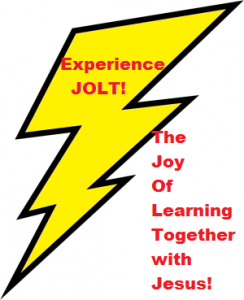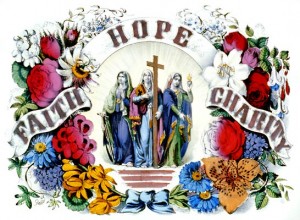====================
A sermon offered on Twenty-Fifth Sunday after Pentecost (Proper 28B, Track 1, RCL), November 15, 2015, to the people of St. Paul’s Episcopal Church, Medina, Ohio, where Fr. Funston is rector.
(The lessons for the day are 1 Samuel 1:4-20; 1 Samuel 2:1-10; Hebrews 10:11-25; and Mark 13:1-8. These lessons may be found at The Lectionary Page. The collect for the day, referenced in the sermon, is found at the same site.)
====================
 When you sit there in the pew and I stand here in the pulpit and say to you “The Bible says this . . . .” or “The Church teaches that . . . .”, how do you know that I’m telling you the truth? When the writer of the Letter to Hebrews admonishes you to “approach [the sanctuary of God] with a true heart in full assurance of faith,” how do you have that assurance? When that writer, again, encourages you to “hold fast to the confession of our hope without wavering,” how do you know what that confession is? And when Jesus commands you, “Beware that no one leads you astray,” how do you make the judgment to exercise that caution?
When you sit there in the pew and I stand here in the pulpit and say to you “The Bible says this . . . .” or “The Church teaches that . . . .”, how do you know that I’m telling you the truth? When the writer of the Letter to Hebrews admonishes you to “approach [the sanctuary of God] with a true heart in full assurance of faith,” how do you have that assurance? When that writer, again, encourages you to “hold fast to the confession of our hope without wavering,” how do you know what that confession is? And when Jesus commands you, “Beware that no one leads you astray,” how do you make the judgment to exercise that caution?
I submit to you that all of those questions have one answer: on-going Christian formation, lifelong Christian learning, adult Christian education, call it what you will it boils down to the same thing – using, on a regular basis, the sense, reason, and intellect with which God has endowed us to enter into ever-deepening understanding of our faith. And it begins, as our opening collect suggested, with hearing, reading, marking, learning, and inwardly digesting the Holy Scriptures.
Blessed Lord, who caused all holy Scriptures to be written for our learning: Grant us so to hear them, read, mark, learn, and inwardly digest them, that we may embrace and ever hold fast the blessed hope of everlasting life, which you have given us in our Savior Jesus Christ; who lives and reigns with you and the Holy Spirit, one God, for ever and ever. Amen. (Proper 28, The Book of Common Prayer 1979, page 236)
One of the first things Thomas Cranmer, the first Reformed Archbishop of Canterbury, did after being appointed in 1533 was to convince King Henry VIII to publish an English translation of the Holy Bible and to authorize its public use. Cranmer hired Myles Coverdale to undertake the task and between April of 1539 and December of 1541 seven printings of this translation were made. Because of its large physical size, it was called The Great Bible. Copies of it were distributed to every church in England, chained to pulpits or lecterns, and there made available to any literate person who wished to come and read the Holy Scriptures for themselves. In addition, a reader was provided in every church so that the illiterate could hear the Word of God in plain English.
Cranmer then undertook, with the assistance of other bishops and scholars, to translate the church’s liturgy from medieval Latin into the common English of the day. He is the chief architect of The Book of Common Prayer, the first edition of which was published in 1549. Cranmer’s vision was of an English national church gathered in household units each morning and evening, gathered in parish churches each Sunday morning, reading through most of the Bible each year. His vision was of a Christian people who would be, in the words of one of our Lenten prayers, “fervent in prayer and in good works.” (Preface for Lent, BCP 1979, page 379) Fervent – on fire – energized for their mission “to represent Christ and his Church; to bear witness to him wherever they may be; and . . . to carry on Christ’s work of reconciliation in the world.” (Catechism, BCP 1979, page 855)
Our church continues that tradition with that same vision today through a Daily Office lectionary which leads us through almost the whole of Scripture over the course of two years and a Eucharistic lectionary (which we now share with many other mainstream Christian denominations) that guides us through most of the New Testament in a three-year cycle and much of the Old Testament in a six-year cycle. In this, we continue what Australian priest and author Adam Lowe calls the “extremely strong tradition” of “Anglican openness to the Bible.” (Blog entry October 29, 2010)
When Cranmer and his colleagues devised the annual cycle of prayer and reading embodied in the Prayer Book, they created also the cycle of weekly collects which begin Sunday worship services. On the First Sunday of Advent each year, their calendar of collects bid the church pray for God’s grace to “cast awaye the workes of darknes, and put upon us the armour of light.” (BCP of 1549) We still offer that same prayer on Advent 1. On the Second Sunday of Advent, they prescribed the original version of the collect which we now pray on this, the penultimate Sunday of the church year.
Although the “collect of the day” is (according to the rubrics in the BCP) normally said only by “the Celebrant,” today I asked that we all read that prayer together. I did so to underscore the corporate nature of that and every prayer said during worship; the Presider does not pray alone. The word “Amen,” in which the congregation joins at the end of every prayer, is a Hebrew word meaning “So be it.” It means, “Yes! We agree. We said that prayer with you. That’s our prayer.” So, this morning, we made it our prayer not only in agreement but in fact, our prayer and our commitment that we, each one of us and all of us together, will “hear [the holy Scriptures], read, mark, learn, and inwardly digest them.” We Anglicans have all been making that commitment, at least once a year, for 466 years!
We’ve been making that commitment, but let’s be honest, we’ve not been very good at keeping it. Even though our church teaches (in the Charter for Lifelong Christian Formation) that “faith formation . . . is a lifelong journey with Christ, in Christ, and to Christ,” a lifelong process of “growth in the knowledge, service, and love of God as followers of Christ . . . informed by scripture, tradition, and reason,” I’ve been told by adult members of our church that (and I quote) “I don’t need any adult education.” Well . . . I can only tell you my experience.
When I moved back to Las Vegas as an adult in 1976 and, after a half-dozen years of not being active in the church, decided to attend Christ Episcopal Church, one of the first things I was invited to do was attend an adult education class. I’m glad I accepted the invitation. For the next dozen years I took part in at least one adult study every year, then I read for Holy Orders and got ordained, and for the last quarter century as a professional clergy person I have studied Scripture and church tradition nearly every day . . . and I still learn things. In fact, preparing for this sermon this past week I learned some things about The Great Bible that I hadn’t known before.
As I told you last week, because of my study of Scripture and church tradition, I believe that “God Loves Everyone – No Exceptions” is unqualifiedly true; for the same reason, I believe that “I don’t need any adult education” is unqualifiedly false. No one is ever too young, too old, or too knowledgeable to learn. And when we don’t make the effort and take the opportunity to do so, our fervor diminishes, the fire dies, the energy dissipates, and (in the words of our Ash Wednesday litany) we “fail to commend the faith that is in us” (BCP 1979, page 268).
So we have prayed every year for the grace to “hear, read, mark, learn, and inwardly digest” the Holy Scriptures, and by so praying have committed ourselves to undertake the lifelong Christian formation that that implies, but what do these five educational activities entail? English priest and poet Malcolm Guite has called them “five glorious verbs” which “deepen as they follow one another in intensity of engagement.” (Blog entry December 8, 2012)
Of hearing, Guite writes that this is “where most people, at the time of [our opening collect’s] composition would start; with hearing! Most people weren’t literate, and though the reformers had made sure a Bible ‘in a language understanded of the people’ was set in every church, most people had to hear it read aloud by someone else.” And many people are still there, at the hearing stage. We may hear the words proclaimed in worship and preached on from the pulpit, but though we may have a Bible in our homes, it is seldom opened. We really have to take the next step of our commitment: we have to read Holy Scripture ourselves.
Guite correctly notes that “the translation of the Bible into English was the single greatest spur to the growth of literacy in the English-speaking world and Bible translation remains today one of the great drivers of literacy and education with all the good that follows.” It was the Renaissance scientist Galileo Galilei who said, “I do not feel obliged to believe that the same God who has endowed us with sense, reason, and intellect has intended us to forgo their use.” (Letter to the Grand Duchess Christina, 1615) When we fail to read the Bible, we do forego their use, but when we study Scripture and tradition for ourselves we honor these gifts of God, with all the literacy, education, and good that flow from them.
The third verb in our prayer is “mark,” which in Cranmer’s day meant simply to “pay attention.” I’m one of those people who actually does mark pages as I read. My books (including my study Bible) are filled with color-coded highlights and marginal notations. Guite suggests that the action flows in both directions, that when we study the words of God they “underscore in us those passages which are marked out by God to make their particular mark in us.”
We all know what “learning” is; it happens when (as the dictionary tells us) we “acquire knowledge of or skill in [something] by study, instruction, or experience.” Guite reminds us, though, that we often talk of “learning by heart” and drawing on that he describes learning ascreating pathways in and through our hearts. He tells the story of visiting an elderly woman suffering dementia when he was newly ordained:
At a loss as to how to pray I began to recite the 23rd psalm. Suddenly I became aware of a voice beside me, faint at first but growing stronger. It was the old woman joining in through laboured breath. I had a strong sense that the person speaking these words was not the wandered old lady but the little girl who had learnt them all those years ago. We made it to the end of the psalm together and she died peacefully as I was saying the Gloria. “I will dwell in the house of the Lord forever” were the last words on her lips.
Though dimmed with age and dementia, the fervor, the fire, the energy of her learning still coursed the pathways in and through her heart.
And, finally, our collect commits us to “inwardly digest” what we hear, read, mark, and learn. Guite reminds us of Jesus words to Satan, “One does not live by bread alone, but by every word that comes from the mouth of God.” (Mt 4:4) Says Guite, “We are to live on, and be sustained by scripture just as we live on and are sustained by bread, to take it in daily till it becomes transformed into part of the very substance of who we are, giving us new strength.” Daily, lifelong learning gives us the fervor, the fire, the energy needed for life.
Adam Lowe, whom I mentioned earlier, insists that this commitment to inwardly digest Scripture demands that we study it corporately. He suggests that the three spheres in which we encounter the Bible – personal study and devotion, in small study groups, and as a worshiping community – are not separate but complementary, and that we need all three to fully “digest” the Scriptures. We learn best when we learn together. Lowe says, “We are to read [Scripture] in fullness and in depth, with each other, and also with God; with our hearts, heads, and hands. Not just that the sound may reach our ears, but be so inwardly digested that it transforms our lives and is reflected outwards and onwards.”
This is the goal of the Episcopal Church’s commitment to lifelong Christian formation, fostering and sustaining spiritual transformation so that we, individually and corporately, may live “into the reality that we are all created in the image of God and carry out God’s work of reconciliation, love, forgiveness, healing, justice, and peace.” (Charter for Lifelong Faith Formation) To that end, I am delighted that our vestry has taken seized opportunity for us to be one of five parishes working with the Vibrant Faith consultancy group to pilot a program of event-centered intergenerational Christian learning that we at St. Paul’s, Medina, are calling JOLT! – The Joy Of Learning Together!
The goal of JOLT! is to (in the words of our parish vision statement) “Set Hearts on Fire with Jesus Christ” so that all of us may
- Grow in our relationship with God;
- Live as disciples of Jesus in all areas of our lives;
- Develop an understanding of the Bible;
- Deepen our spiritual lives and practices;
- Engage in service and mission to the world; and
- Participate in the life and ministries of the church.
In short, the goal of JOLT! is to continue and to live into the vision of Archbishop Cranmer, the vision with which our Anglican tradition began, to form us into a people “fervent in prayer and good works,” a people who “hear, read, mark, learn, and inwardly digest” the Holy Scriptures, a people who when admonished to “hold fast to the confession of our hope without wavering” know exactly what that means, a people who when commanded to “beware that no one leads you astray” know very well how to exercise that caution.
I encourage you to be a part of JOLT! Participate in the first JOLT! Event on December 9, because it is unqualifiedly true that no one is ever too young, too old, or too knowledgeable to learn, and we learn best when we learn together.
Amen.
====================
A request to my readers: I’m trying to build the readership of this blog and I’d very much appreciate your help in doing so. If you find something here that is of value, please share it with others. If you are on Facebook, “like” the posts on your page so others can see them. If you are following me on Twitter, please “retweet” the notices of these meditations. If you have a blog of your own, please include mine in your links (a favor I will gladly reciprocate). Many thanks!
====================
Father Funston is the rector of St. Paul’s Episcopal Church, Medina, Ohio.
 Last week, I gave away the ending of Job. I told you that everything turned out all right in the end, and so it has. Job has repented, not of any sin that warranted his suffering, but of the pride and arrogance (and ignorance) he displayed during his suffering by demanding to confront God. God has forgiven him and to make up for all his loss, his fortunes have been restored many times over. Happy ending! Except not quite . . .
Last week, I gave away the ending of Job. I told you that everything turned out all right in the end, and so it has. Job has repented, not of any sin that warranted his suffering, but of the pride and arrogance (and ignorance) he displayed during his suffering by demanding to confront God. God has forgiven him and to make up for all his loss, his fortunes have been restored many times over. Happy ending! Except not quite . . .  When I was learning the art of preaching, my instructor was a fan of the old Barthian aphorism that a homilist should enter the pulpit with the newspaper in one hand and the Bible in the other. So here I am, newspaper and Bible at the ready, and opening the first I find glaring at me the headline you all have also seen: another mass shooting in America – the 294th multiple gun homicide of the year. Like many, if not most, of the clergy here this evening I have preached too many sermons about mass murder and gun control: after Columbine, after the Aurora theater, after the Milwaukee gurdwara, after Sandy Hook Elementary School, after Mother Emanuel Church, after so many others . . . . I’m sorry; my heart is broken and my prayers arise for the Umpqua College victims, their families, and their community. But, even as we gather to remember the Little Poor Man of Assisi, in whose name we often pray, “make me a servant of your peace,” I just don’t have another mass-murder-gun-control sermon to offer.
When I was learning the art of preaching, my instructor was a fan of the old Barthian aphorism that a homilist should enter the pulpit with the newspaper in one hand and the Bible in the other. So here I am, newspaper and Bible at the ready, and opening the first I find glaring at me the headline you all have also seen: another mass shooting in America – the 294th multiple gun homicide of the year. Like many, if not most, of the clergy here this evening I have preached too many sermons about mass murder and gun control: after Columbine, after the Aurora theater, after the Milwaukee gurdwara, after Sandy Hook Elementary School, after Mother Emanuel Church, after so many others . . . . I’m sorry; my heart is broken and my prayers arise for the Umpqua College victims, their families, and their community. But, even as we gather to remember the Little Poor Man of Assisi, in whose name we often pray, “make me a servant of your peace,” I just don’t have another mass-murder-gun-control sermon to offer. So here’s a thing that happened this week . . . . We prepared the bulletins for today; both the church secretary and I reviewed them and proof-read them and only after they’d been copied and folded that I saw something out of order with today’s Psalm (as printed in the bulletin). It’s Verse 10….
So here’s a thing that happened this week . . . . We prepared the bulletins for today; both the church secretary and I reviewed them and proof-read them and only after they’d been copied and folded that I saw something out of order with today’s Psalm (as printed in the bulletin). It’s Verse 10…. As photos of his lifeless body laying face down in the sand made their way instantaneously around the world, an international hew and cry was heard; in a phrase, the world said, “Refugees’ lives matter! Syrian lives matter!” In response to the death of that one, specific little boy, no one was heard to say, “All lives matter” . . . .
As photos of his lifeless body laying face down in the sand made their way instantaneously around the world, an international hew and cry was heard; in a phrase, the world said, “Refugees’ lives matter! Syrian lives matter!” In response to the death of that one, specific little boy, no one was heard to say, “All lives matter” . . . .  “This is neither the time nor the place . . . .”
“This is neither the time nor the place . . . .” 

